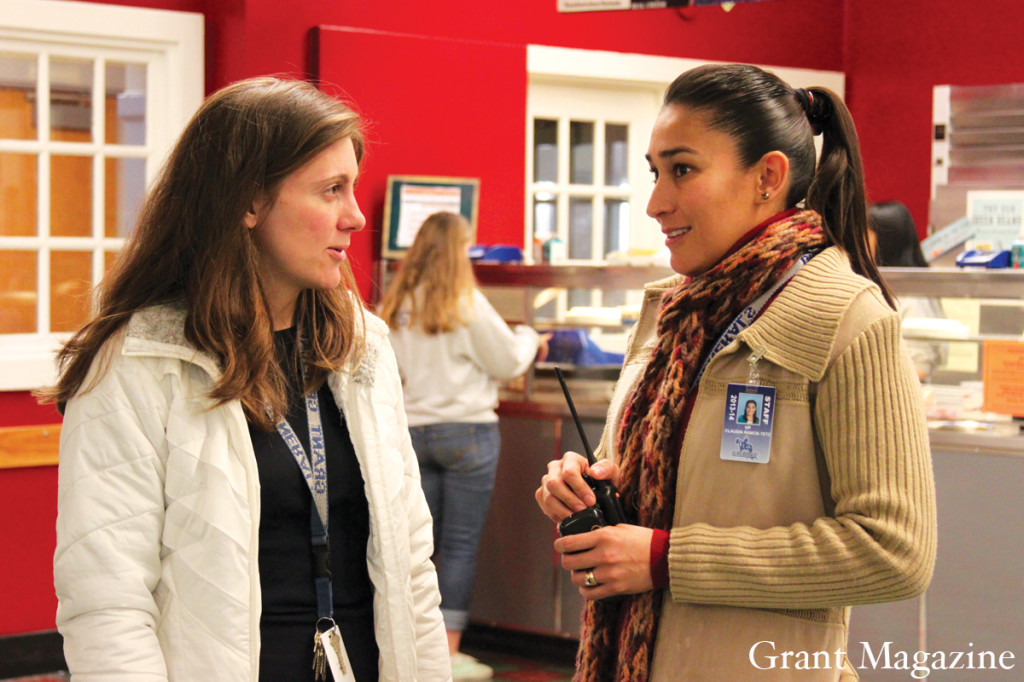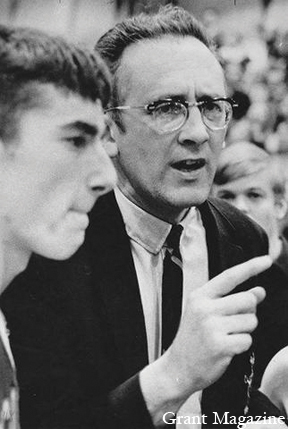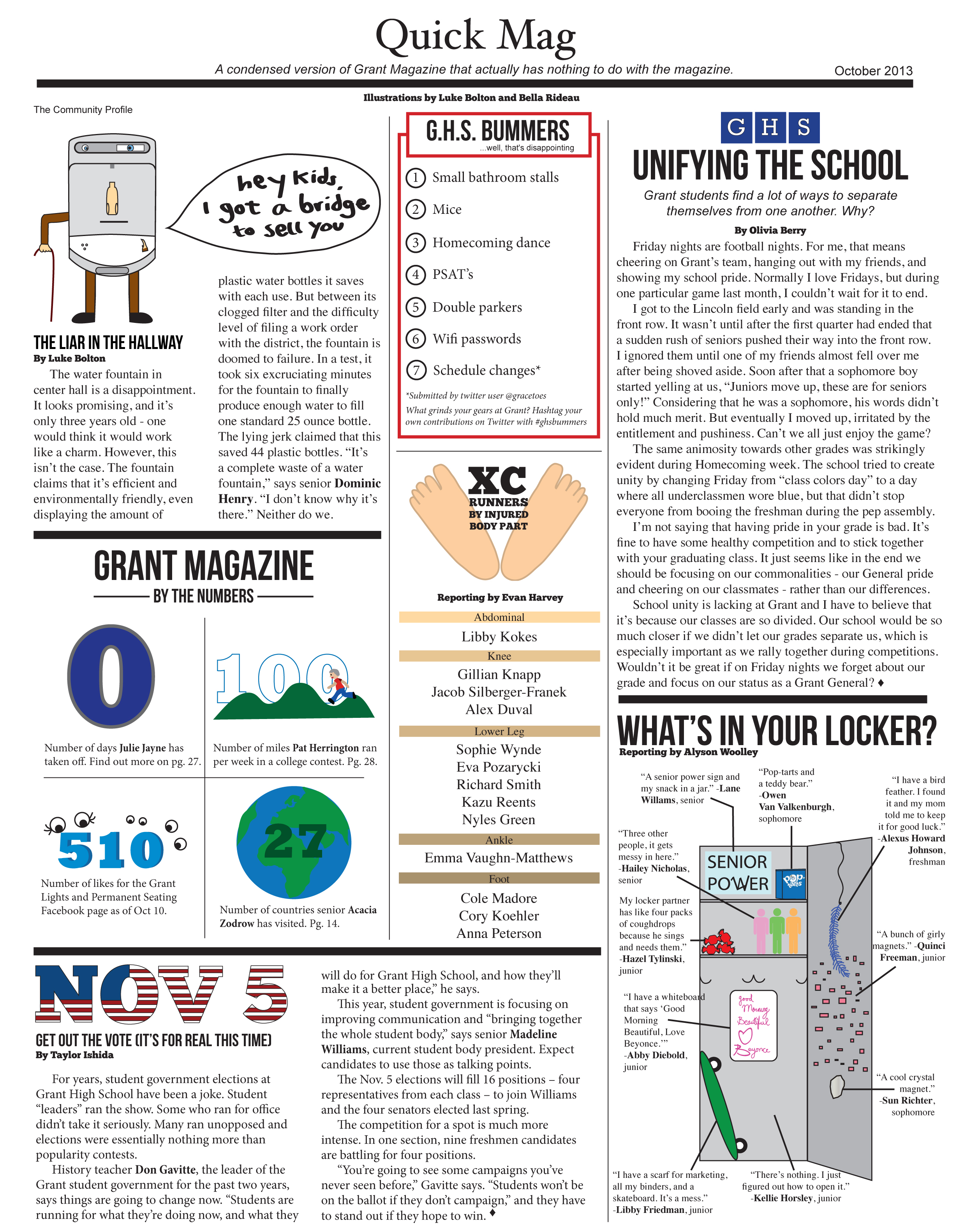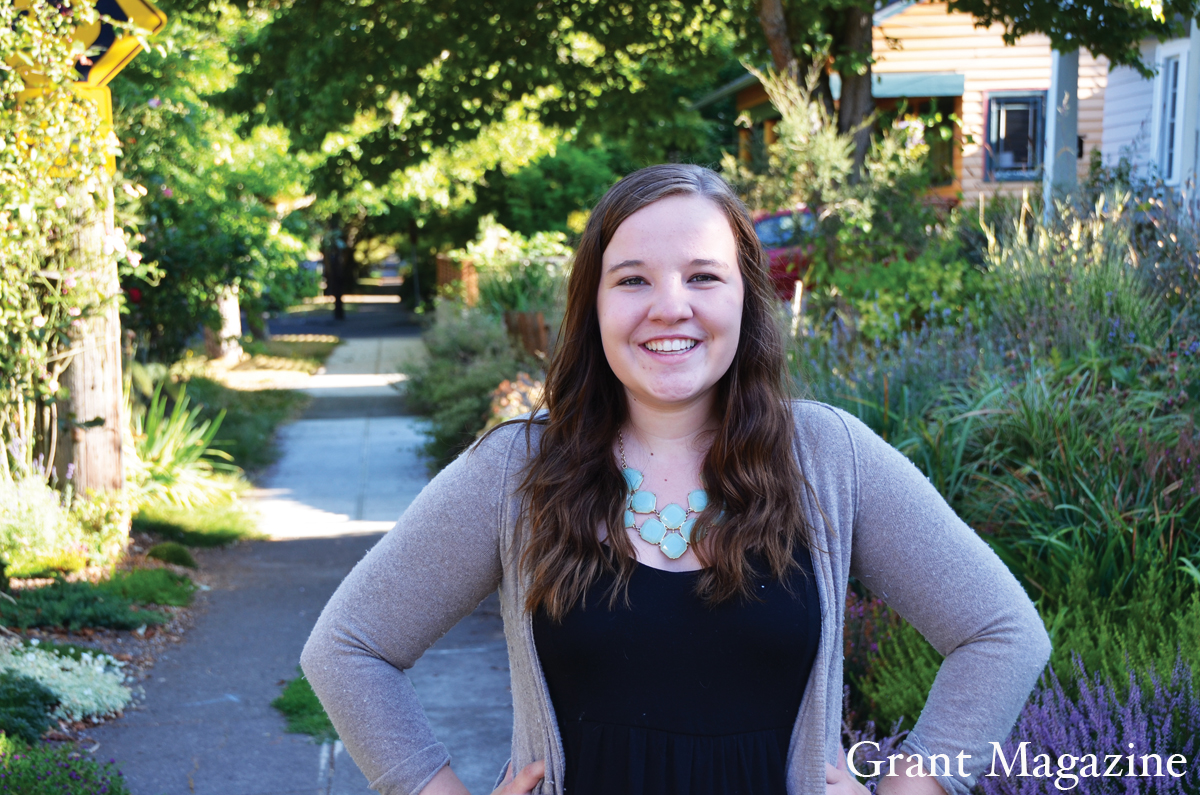
Claudia Ramos-Tetz sits in a booth beside her husband, Tim Tetz, at Chang’s Mongolian Grill in Gresham. Two of Tetz’s old students approach and introduce their family to the couple. The former pupils have family visiting from Mexico and their mother holds a two-month-old baby in her arms.
“Hola,” Ramos-Tetz says repeatedly to the infant, cooing in her best baby voice.
Tetz jokes that the former seventh grade student, a high school sophomore now, used to always have his fists up, ready to fight anyone who looked at him wrong. Now he smiles non-stop as Ramos-Tetz asks him and his sister, also a high school student, about school.
What classes are you taking? Got good grades? She leaves them with the insistence that they get only As and Bs through high school. Ramos-Tetz takes every opportunity she gets to encourage young students, especially kids of color, to be high achievers.
Ramos-Tetz is Grant’s new vice principal, taking the place of Curtis Wilson, who is now principal at Benson High School. She works mostly with discipline, but also helps with academic development and school safety. To people who know her well, she is a role model.
Behind her bubbly and gentle persona, Ramos-Tetz is a fierce advocate for social justice. She uses her personal experiences as a Latina, coupled with a dedication to education, to inspire everyone around her to be what she calls “eternal learners.”
Ramos-Tetz, the oldest of three girls, was born and raised in Guadalajara, Mexico. Her neighborhood was a new development at the time, but has since been swallowed by urban expansion.
Sometimes, Ramos-Tetz and her friends would go out and explore other parts of the city. Some days, she would leave in the morning with her sisters and cousins and stay out until dark, occasionally touching base at home for midday meals. “We were like famous in our neighborhood,” she says, “for having the biggest set ups for Barbies.”
Ramos-Tetz and her sisters would kick the family car out of the driveway to make room for a sizable collection of plastic Barbie dollhouses that served as an imagination station for other kids in the community.
Every Sunday, the whole Ramos family would rendezvous for dinner and card games. Viuda and Chinaso were family favorites. In the summertime, Ramos-Tetz loved playing in neighborhood soccer tournaments that lasted all day. She would come home covered in dust.
Her uncle, Alfonso Ramos, was there from the beginning. He had fallen in love and married while looking for work in Portland as a young man. He stayed there with his wife, Betty, for the next 26 years, raising four children and serving in the U.S. Navy during the Korean War. Ramos returned to Guadalajara the year after Ramos-Tetz was born.
“As a teenager, I was wanting to rescue the world and save everybody.” – Claudia Ramos-Tetz
He was always around during her childhood, entertaining and bugging Ramos-Tetz however he could. On one occasion, all the kids of the family bought donuts at a nearby market. Ramos-Tetz wanted to save hers for later, so she asked the others not to eat it and left it on the kitchen counter. Big mistake. Her uncle promptly gobbled it up when she was out of the room, sparking a grudge held to this day.
Ramos-Tetz accuses her uncle of giving her first boyfriend a hard time for his pierced ears and long hair. He smiles, adding that he once threatened to cut it off the guy’s head.
“We argue a little bit every once in a while,” says Ramos.
Ramos-Tetz clarifies: “We grew up having very open conversations about everything,” she says, hinting at a political divergence. “We agree to disagree.”
Ramos counters: “When she decides something, she’s gonna do it.”
As a kid, Ramos-Tetz was somewhat reserved around adults. “I was very obedient,” she says. “I was a follower of the rules.”
But she had a wild side, too. One time, she and a few friends put on an impromptu dance show for stopped traffic on a street corner. They parked their car, rolled down the windows, turned up the radio and let loose. Other times, her posse would play “ding dong ditch” in the neighborhood, running from home to home ringing doorbells, only to dash away mischievously before anyone could answer.
Selflessness is another side of Ramos-Tetz’s persona. “As a teenager, I was wanting to rescue the world and save everybody,” she says.
Where Ramos-Tetz lived, it was common to see impoverished children selling bubble gum or washing windows for pennies. She drove past them daily, but couldn’t resist helping one day. She blew off her high school friends and took one of the boys out to lunch, buying him a huge piece of lemon pie for dessert.
Ramos-Tetz and her sisters attended Colegio Ingles, a private bilingual academy in the city that stressed English as a second language. For the kids, failure was not an option.
Their father, Don Javier Ramos, was a well-respected math and science professor at a local university and was very passionate about education. As his daughters grew up, he made it clear that schooling was the number one priority.
“When it came time to do homework or time to study for an exam, the TV was shut off,” Ramos-Tetz recalls. “We couldn’t go out with friends. Our dad would sit us down and we did our work. That was it.”
Ramos-Tetz’s dad always said: “Anybody can take things away from you. They can take away your house, your job, your things. But nobody can take away your education.”
It’s a credo that Ramos-Tetz carried with her into ITESO, a highly selective college in Guadalajara. She aced her first year at the school and took a yearlong trip with her family afterward. They had traveled around Mexico and elsewhere throughout Ramos-Tetz’s childhood, but they wanted to spend an entire year in the United States to hone the girls’ English. “When I came here, I had to throw all my English from the books away,” says Ramos-Tetz.
English language classes became part of the routine as they explored, staying in a rented house in Gresham. They did all the “touristy” things around Portland. Multnomah Falls. Mount Hood. Pittock Mansion.
During Christmas break, a cousin from Mexico stayed with them and exercised with Ramos-Tetz at a nearby fitness center in the downtime. That’s where her path crossed with Tim Tetz, a young middle school teacher who was tired of dating for fun. He wanted a more serious relationship.
“There was something so plain and simple about her,” says Tetz. Long dark hair. No makeup. He had no doubts. “I’m gonna marry that girl,” he said to his friend, who was running alongside him on a treadmill.
The next day, Ramos-Tetz was at the gym again, but Tetz didn’t have the guts to talk to her. On day three, he made his little sister talk to the two young women and started showing off by doing push-ups using only his index fingers. He finally asked Ramos-Tetz – and her family – out to a Barlow High School basketball game.
Three months later, they were engaged. They were legally married in Portland, but wanted a more meaningful wedding celebration. They flew to Mexico and had a religious ceremony with the entire Ramos family. Tetz’s parents were hesitant to join because they were scared of being outsiders, but Ramos-Tetz’s family had a way of making them feel at home. “I forgot that I wasn’t from there,” says Tetz.
When the newlyweds got back to the United States, their eyes were opened to something they hadn’t ever dealt with head on. One day, they were speaking a mix of Spanish and English together while shopping at Costco. A man nearby yelled: “Speak English. We’re in America now.”
Tetz felt a rising fury that he’d never experienced. His new wife told him to let it go. “You don’t understand,” he told her. “He’s being racist.”
Tetz explained that the man might as well have called her a “beaner,” a racist slur. Ramos-Tetz started dancing. “I’m a frijolito,” she said. I’m a bean. “No. You don’t get it. You’re supposed to get mad,” said Tetz, becoming frustrated.
Ramos-Tetz looked him in the eye and countered: “You don’t get it. He wants you to get mad.”
As far as Ramos-Tetz knows, her ancestry comes from Spain and England, but it wasn’t something she had to think about growing up. “We really didn’t pay much attention to the makeup of people,” she says. “We were all Mexicans.”
The nuances of race in the United States were hard to comprehend and Ramos-Tetz often thought she was imagining the subtle racism that permeates American culture. She was annoyed with the fact that society classifies everyone by race, so when she was asked to categorize herself on official forms, she created her own box: human.
At that point, the couple was living in a Gresham condo. Tetz taught at Five Oaks Middle School across town in Beaverton. Ramos-Tetz earned an associates degree in business at Mt. Hood Community College two years later. She had completed a similar program in Guadalajara already, but MHCC didn’t accept the Mexican credits.
Ramos-Tetz and her husband moved to McMinnville after that so she could get a bachelor’s degree in business at Linfield College. She finished in a year, because Linfield recognized all of her previous work.
In 1999, they moved back to the Gresham area and Ramos-Tetz landed a job at Reynolds High School as an instructional assistant. She worked for the North Clackamas School District and later took a job at Centennial Middle School working with struggling students and their families. It was here that Ramos-Tetz would start making a significant impact.
Laura Bolaños, a former student of Ramos-Tetz, is the first female in her family to graduate high school. She’s now in Concordia University’s social work program. This, Bolaños claims, is all thanks to “Ms. Claudia,” a nickname that has stuck with Ramos-Tetz.
“Over time, Ms. Claudia became more than a teacher to me,” says Bolaños. “She totally changed my life.”
Ramos-Tetz served as a role model, never breaking down or lowering her expectations.
“For Latino kids, she was like the missing piece of the puzzle, you know?” -Laura Bolanos, former student
Bolaños remembers one incident in particular that upsets her to this day. In her social studies class, Bolaños and her friends were speaking Spanish and Russian back and forth. Their regular history teacher was absent for the day. When the substitute overheard Bolaños and her friends conversing in a language other than English, she turned to Bolaños and said she had to stop speaking Spanish immediately unless she wanted to “end up cleaning toilets and picking strawberries like her parents.”
Bolaños was horrified. She never expected that to come from a teacher, an authority figure, someone she trusted. The comment ate at her for days. It made her feel like her parents were ignorant because they did work as farmers and maids. But that was the best they could do. The teacher’s comment made her think they weren’t good enough for better jobs and she started giving in to the feelings of helplessness.
None of her friends said anything. Neither did Bolaños for a long time. But one day, she couldn’t take it anymore, so she sought out the only person she trusted.
Ramos-Tetz first questioned why Bolaños hadn’t said something sooner. “Ms. Claudia’s next words to me were: ‘If you don’t want to be treated like this, you gotta go back to school. They can take your house, your car, your job. Anybody can take anything away. But nobody can take away your education.’”
Now, Bolaños has two semesters left to go in her final year at Concordia. She works mostly with young kids from immigrant families and hopes to get a master’s degree. “I always used to tell her she should be the principal,” says Bolaños of Ramos-Tetz. “And she said: ‘You just watch. One day I will be.’”
Ramos-Tetz is well on her way there. She was hired as Grant’s vice principal of discipline in August. “My long term goal is to become a superintendent,” she explains. “But in the process, I also want to make sure that I enjoy life. So that’s what I’m shooting for, but I’m not necessarily in a hurry.”
To balance out the stress of busy jobs, Ramos-Tetz and her husband make time to enjoy the little things, like going to the movies and playing with their dogs. They have always been animal lovers.
They are also travelers and soft-core adrenaline junkies. For their tenth anniversary in 2005, Ramos-Tetz and her husband backpacked around Europe for 35 days, constantly moving. Amsterdam. Prague. Munich. The holocaust museum in Dachau. Vienna. Cinque Terre. Rome. A humbling sunrise in Venice. Florence. Paris. London, two weeks after a series of deadly public transit bombings.
Why? “Because we’re crazy,” says Ramos-Tetz. “For our 15th anniversary, we jumped out of a plane.” But for veteran educators, learning comes first. “As the school year happens, I’m invested in education. That’s all I do,” says Ramos-Tetz.
Both she and Tetz are workaholics. Their schedules are constantly shifting to accommodate students, parents and meetings with other teachers. Ramos-Tetz tries to inspire everyone she meets to be an “eternal learner,” like herself.
Ramos-Tetz shares responsibilities with the rest of the administrative team at Grant, but focuses on discipline. Her style is not simply “crime and punishment.” She carries on the legacy of restorative justice established a few years ago at Grant, a system that focuses on relationship repair and dishes out reconciliation instead of expulsions. “She’s gonna hold you accountable,” says her husband.
“I loved my kids and I really enjoyed being in the classroom.” – Claudia Ramos=Tetz
Tetz had to learn for himself that getting called out shouldn’t be taken as an insult, but an opportunity to grow. He notices that students usually have no problem with Ramos-Tetz’s sincerity, but adults sometimes can’t take even a drop of criticism. But Ramos-Tetz holds the same expectations for teachers that she asks of students. If students can’t drink soda in class, teachers shouldn’t be guzzling big gulps at their desks.
Ramos-Tetz’s mentality meshes well with the rest of the administrative team. They all want to focus on building relationships and truly getting to know the school before making heavy-handed decisions. “I think it’s interesting being an all-female administration that has kind of a different flavor,” says the other vice principal, Kristyn Westphal.
Principal Carol Campbell notes that Ramos-Tetz has a welcome objective point of view. “I think she brings a perspective into what it was like to come to this country and not be able to speak the language but be able to be successful,” she says, adding that Ramos-Tetz has been a “go getter” from day one.
Ramos-Tetz enjoys being an administrator because she can have a bigger impact on student wellbeing, but finds it harder to build solid relationships with so many of them. “I loved my kids and I really enjoyed being in the classroom,” she says. “I think that’s one of the things I miss as an administrator.”
She says she will never shy away from discussions about race and how it affects the classroom and schools. It might be difficult to talk candidly about, but it needs to be done.
Ramos-Tetz is currently enrolled in Portland State University’s Continuing Administrative License Program, along with her husband. It’s less glamorous than skydiving and usually entails long days in front of a computer. But for Ramos-Tetz, learning comes first. “I think that learning is what makes you a better human,” she says. ♦





